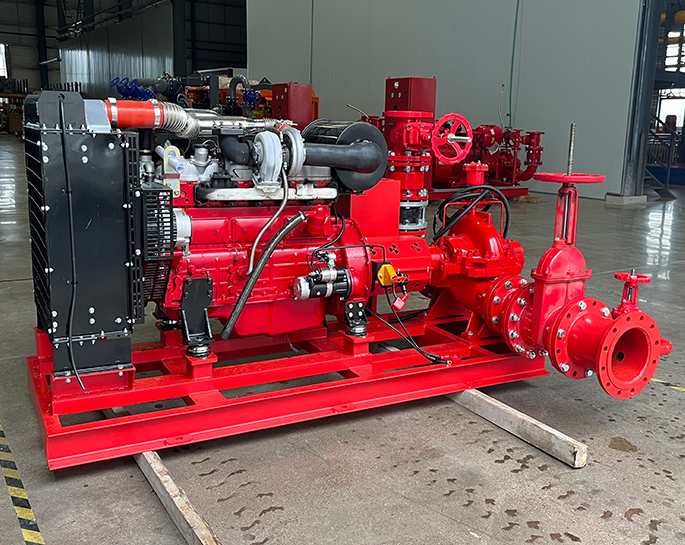What are the factors affecting the efficiency of a diesel fire pump?
Mar 11, 2024
Share:
The efficiency of a diesel fire pump refers to its ability to effectively deliver water or other fire suppression agents to extinguish fires while minimizing energy consumption and operational costs. Several factors can affect the efficiency of a diesel fire pump:
1. **Design and Sizing**: The design and sizing of the fire pump system play a significant role in its efficiency. Properly sizing the pump and associated components to match the specific fire protection needs of the building or facility ensures optimal performance and efficiency.
2. **Operating Conditions**: Factors such as ambient temperature, altitude, and humidity can affect the operating efficiency of the diesel engine powering the fire pump. Extreme environmental conditions may reduce engine performance and efficiency.
3. **Maintenance**: Regular maintenance is essential to keep the diesel fire pump system operating at peak efficiency. This includes tasks such as engine tune-ups, lubrication, fuel system cleaning, cooling system maintenance, and inspection of components for wear or damage.
4. **Fuel Quality**: The quality and cleanliness of the diesel fuel used to power the engine can significantly impact its efficiency. Contaminated or low-quality fuel can lead to poor combustion, reduced engine performance, and increased fuel consumption.
5. **System Design and Layout**: The layout and design of the fire pump system, including piping, valves, and fittings, can affect its efficiency. Properly designed piping layouts with minimal friction losses and optimized flow paths help maintain efficient water delivery to fire protection systems.
6. **Control and Monitoring Systems**: Efficient control and monitoring systems, such as pump controllers and instrumentation, are essential for optimizing the operation of the fire pump system. Automatic start/stop functionality, pressure regulation, and real-time performance monitoring contribute to overall efficiency.
7. **Training and Operator Skill**: Adequate training and skill of personnel operating the diesel fire pump system are crucial for maximizing efficiency. Proper operation and maintenance practices, as well as timely response to alarms or system faults, help ensure efficient and effective fire protection.
8. **System Integration**: Integration with other fire protection systems, such as sprinkler systems, hydrants, and alarm systems, can impact the overall efficiency of the fire pump system. Proper coordination and communication between different systems optimize fire response and minimize energy consumption.
9. **System Upgrades and Modernization**: Upgrading outdated components or adopting modern technologies, such as variable speed drives or energy-efficient engines, can improve the efficiency of existing diesel fire pump systems. Retrofitting with energy-saving devices or optimizing system configurations can also enhance overall efficiency.
By considering these factors and implementing appropriate measures, facility managers and fire protection professionals can ensure that diesel fire pump systems operate efficiently, providing reliable fire protection while minimizing energy consumption and operating costs.

1. **Design and Sizing**: The design and sizing of the fire pump system play a significant role in its efficiency. Properly sizing the pump and associated components to match the specific fire protection needs of the building or facility ensures optimal performance and efficiency.
2. **Operating Conditions**: Factors such as ambient temperature, altitude, and humidity can affect the operating efficiency of the diesel engine powering the fire pump. Extreme environmental conditions may reduce engine performance and efficiency.
3. **Maintenance**: Regular maintenance is essential to keep the diesel fire pump system operating at peak efficiency. This includes tasks such as engine tune-ups, lubrication, fuel system cleaning, cooling system maintenance, and inspection of components for wear or damage.
4. **Fuel Quality**: The quality and cleanliness of the diesel fuel used to power the engine can significantly impact its efficiency. Contaminated or low-quality fuel can lead to poor combustion, reduced engine performance, and increased fuel consumption.
5. **System Design and Layout**: The layout and design of the fire pump system, including piping, valves, and fittings, can affect its efficiency. Properly designed piping layouts with minimal friction losses and optimized flow paths help maintain efficient water delivery to fire protection systems.
6. **Control and Monitoring Systems**: Efficient control and monitoring systems, such as pump controllers and instrumentation, are essential for optimizing the operation of the fire pump system. Automatic start/stop functionality, pressure regulation, and real-time performance monitoring contribute to overall efficiency.
7. **Training and Operator Skill**: Adequate training and skill of personnel operating the diesel fire pump system are crucial for maximizing efficiency. Proper operation and maintenance practices, as well as timely response to alarms or system faults, help ensure efficient and effective fire protection.
8. **System Integration**: Integration with other fire protection systems, such as sprinkler systems, hydrants, and alarm systems, can impact the overall efficiency of the fire pump system. Proper coordination and communication between different systems optimize fire response and minimize energy consumption.
9. **System Upgrades and Modernization**: Upgrading outdated components or adopting modern technologies, such as variable speed drives or energy-efficient engines, can improve the efficiency of existing diesel fire pump systems. Retrofitting with energy-saving devices or optimizing system configurations can also enhance overall efficiency.
By considering these factors and implementing appropriate measures, facility managers and fire protection professionals can ensure that diesel fire pump systems operate efficiently, providing reliable fire protection while minimizing energy consumption and operating costs.


.png)
.png)

.png)


